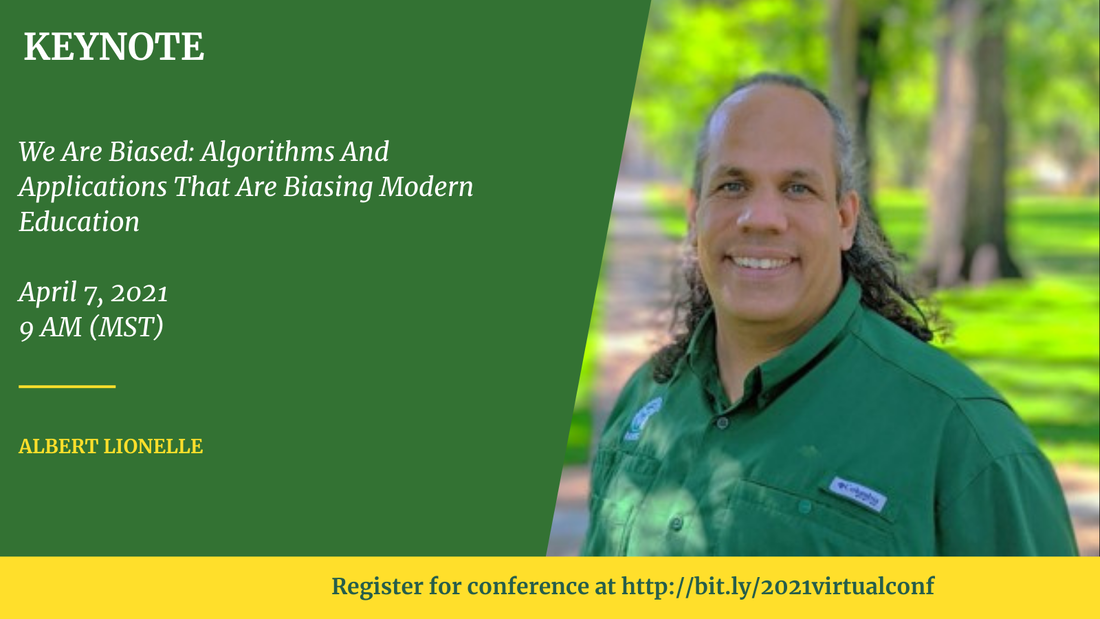Unedited Video of Keynote
Title
Instructor and Curriculum Specialist, Colorado State University, Colorado
Keynote Abstract
Imagine a student in 2021, they are working through the course diligently, and then they come to their midterm exam. They sit down, and the software says it needs access to their webcam to look at their face. The student groans, not because they don’t have a webcam, though their friend does have this issue, but because they know the software won’t be able to see them. They are invisible to face detection, and they will be flagged for cheating. Their professor will assume that out of the 300 students in their class, this student couldn’t possibly have an issue. The software must be correct, and the student must have been cheating. The student will most likely fail the course.
With the increased use of online education tools, especially proctoring tools, it is important to be aware of how these applications may be inherently biased against certain student demographics, and how those biases may be affecting our course design. We will cover six forms of artificial intelligence bias as defined by Microsoft Inclusive Design that are commonly known in computer science, but often not addressed. We will also discuss how our reliance on technology in course design could be biasing our courses, and possible techniques on how to overcome that bias. Simply, we must be conscious of the unconscious biases that went into the design of learning management systems and other products that have become essential in modern course design.
Bio
Albert Lionelle is an instructor and curriculum specialist / designer for the Computer Science Department at Colorado State University. His primary research focus is in computer science education, and has publications in both CS Education and Computer Vision (graphics/artificial intelligence). He is the designer and instructor for CS 150 - Culture and Coding, the first computer science course to be accepted as a guaranteed transfer course under different ways of thinking (GT-AH3) for the State of Colorado. He has led with building the Online Computer Science BS degree for CSU online, working with CDE on developing a STAA for CS, revamping the CS minor, and been an organizer in a revamp of the Computer Science curriculum at CSU leading to five concentrations, plus added flexibility and pathways for students. He is a founder of CSedU, the CS education research group at CSU. His current research focuses on restructuring CS courses around memory enhancing techniques and study structures built into the course design. He followed a very roundabout path to academia. In the past, he has been a high school principal, school board member, life coach, and owner of a sustainable agriculture company in addition to time spent in the defense industry as a developer. In his spare time he teaches historical sword fighting.
Contact Info
Twitter @lionelle
Web https://www.cs.colostate.edu/~lionelle/
Title
Instructor and Curriculum Specialist, Colorado State University, Colorado
Keynote Abstract
Imagine a student in 2021, they are working through the course diligently, and then they come to their midterm exam. They sit down, and the software says it needs access to their webcam to look at their face. The student groans, not because they don’t have a webcam, though their friend does have this issue, but because they know the software won’t be able to see them. They are invisible to face detection, and they will be flagged for cheating. Their professor will assume that out of the 300 students in their class, this student couldn’t possibly have an issue. The software must be correct, and the student must have been cheating. The student will most likely fail the course.
With the increased use of online education tools, especially proctoring tools, it is important to be aware of how these applications may be inherently biased against certain student demographics, and how those biases may be affecting our course design. We will cover six forms of artificial intelligence bias as defined by Microsoft Inclusive Design that are commonly known in computer science, but often not addressed. We will also discuss how our reliance on technology in course design could be biasing our courses, and possible techniques on how to overcome that bias. Simply, we must be conscious of the unconscious biases that went into the design of learning management systems and other products that have become essential in modern course design.
Bio
Albert Lionelle is an instructor and curriculum specialist / designer for the Computer Science Department at Colorado State University. His primary research focus is in computer science education, and has publications in both CS Education and Computer Vision (graphics/artificial intelligence). He is the designer and instructor for CS 150 - Culture and Coding, the first computer science course to be accepted as a guaranteed transfer course under different ways of thinking (GT-AH3) for the State of Colorado. He has led with building the Online Computer Science BS degree for CSU online, working with CDE on developing a STAA for CS, revamping the CS minor, and been an organizer in a revamp of the Computer Science curriculum at CSU leading to five concentrations, plus added flexibility and pathways for students. He is a founder of CSedU, the CS education research group at CSU. His current research focuses on restructuring CS courses around memory enhancing techniques and study structures built into the course design. He followed a very roundabout path to academia. In the past, he has been a high school principal, school board member, life coach, and owner of a sustainable agriculture company in addition to time spent in the defense industry as a developer. In his spare time he teaches historical sword fighting.
Contact Info
Twitter @lionelle
Web https://www.cs.colostate.edu/~lionelle/
